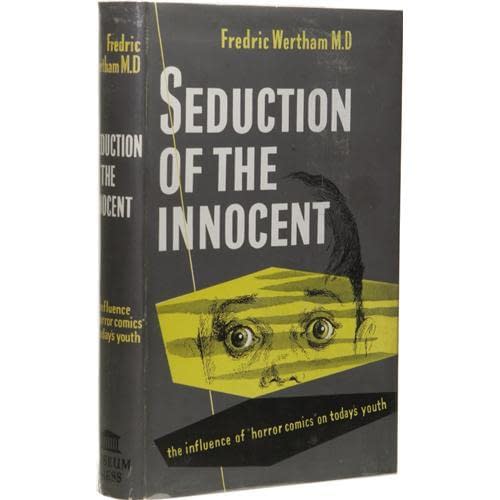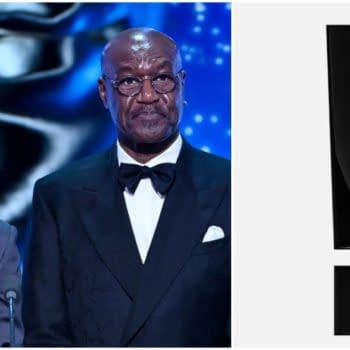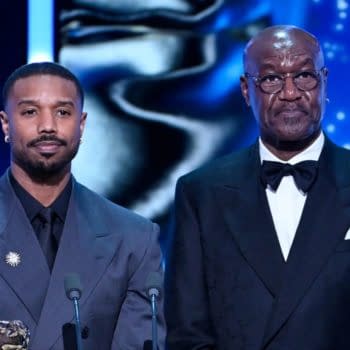Posted in: Movies, Video Games | Tagged: comic book legal defense fund, Comics Code Authority, entertainment, Frederic Wertham, gaming, Seduction of the Innocent, Senator Leeland Yee, video games, violence in video games
Yee's Company: The Political Connection Of Comics & Video Games
By Jared Cornelius
This week California Senator Leland Yee was indicted on charges of corruption and weapons brokering among other things. While the talking heads of cable news can inform you more on that story, what I'd like to talk to you about is Senator Yee's alleged two faced behavior. While I think it's important to note that Senator Yee is innocent until proven guilty, I personally believe there's no smoke without a fire. But I'm sure you're asking yourself why I care about Senator Yee, since this isn't the Huffington Post this is Bleeding Cool, and you want comics and film news, Roooaaarrr! (Dramatic affectation on my part.) While Senator Yee has a long lived political career I could tell you about, my story is about a modern day crusade led on video games, and how 60 years ago comics were fighting a similar battle.
Let me set the stage for you, the year is 2005, Tom Cruise is busy jumping on Oprah's couch, Hurricane Katrina hits New Orleans and a California Senator named Leland Yee intends on making a name for himself. Senator Yee helped author and was the spokesperson for a piece of legislation that called for penalties for the sale of violent video games to minors. Yee's legislation sought $1000 fines for the sale of a violent game to a person under 18 and deemed games that were to violet be fitted with a solid black and white 18 stamp like a numerical scarlet letter. Yee's legislation contained junk science that claimed, "Exposing minors to depictions of violence in video games, including sexual and heinous violence, makes those minors more likely to experience feelings of aggression, to experience a reduction of activity in the frontal lobes of the brain, and to exhibit violent antisocial or aggressive behavior."
Yee would also claim, "Even minors who do not commit acts of violence suffer psychological harm from prolonged exposure to violent video games." Yee was able to convince his fellow Senators of the information having had a background in child psychology. The law was shockingly passed and was scheduled to be put into effect in 2006 if not for the intervention of ESA and the Video Software Dealers Association, who argued that video games deserved the same legal protection as movies, books, or television. The short version of the story is the law was deemed unconstitutional by the Supreme Court who in the landmark case found there was no evidence that video games were harmful to children and were recognized as a protected medium like movies. This was a huge landmark for games who despite what some critics thought were finally recognized legally as an art form.
After Senator Yee's defeat, he came out with pearls of wisdom like, "Unfortunately, the majority of the Supreme Court once again put the interests of corporate America before the interests of our children." And, despite the fact that there is no scientific evidence that games are harmful to children, "As a result of their decision, Wal-Mart and the video game industry will continue to make billions of dollars at the expense of our kids' mental health and the safety of our community. It is simply wrong that the video game industry can be allowed to put their profit margins over the rights of parents and the well-being of children".
So, as someone who's fascinated with the history of our geeky mediums it reminded me of a similar political witch hunt. The 1950's are often portrayed as an idyllic Norman Rockwell-esk setting but the truth is it was a frightening time for lots of people. Despite the fact the basically anyone who wasn't a white male was second class, the government was in a scary period of persecution and shaming. During this time comic books were not looked upon favorably. In 1954 psychiatrist Fredric Wertham would publish his infamous book, Seduction of The Innocent. The book was a torrid condemnation about how comics were a negative influence on children. Wertham claimed that comic books were a leading cause of juvenile delinquency and caused children to steal, promoted sexuality, homosexuality, and violence. Wertham made claims that Batman and Robin were depicted as gay, and Wonder Woman had themes of bondage, (OK so he was bound to get one right.) His claims of scientific findings were alarming for many parents, educators, and politicians who didn't know any better. That year the Senate would hold one of their famous sub committees regarding juvenile delinquency.
Comics publishers like Marvel and DC would be part of the hearing, but the most famous scapegoat was William Gaines, publisher of the EC horror comics. Gaines would go on to be grilled by the committee with the ordeal ending up on the front page of the New York Times the next day. This was a scary time to be going in-front of the government as the McCarthy hearings were going on as well, and the government was doing a great job of painting members of the Army and the State Department as criminals and Communists. One can surmise Gaines was none too popular after the hearings with EC going out of business in 1955. Another effect of the subcommittee hearing was the creation of the Comics Code Authority who created arbitrary rules based on moral decency at the time on what could be published in comic books. Thankfully the CCA was put out of its misery in 2010 and would be repurposed for good by the Comic Book Legal Defense Fund in 2011. In another happy ending we would also discover that much of Wertham's "scientific" findings were made up, with persons included in his presentation to the Senate were made up or amalgamations of different children.
The Senate hearings are 60 years old this year, and Yee's crusade against video games made me think about a different time and a different place where he might have succeeded. The similarities between games in the 2000's and comics in the 1950's are somewhat of a mirror, mirror situation. Comic books went in-front of the government and became more restrictive and monitored, while games did the same and were granted legal protection. While the CCA was never technically controlled by the government the loss of creative freedom by comic's writers and publishers no doubt set the medium back years. Video games however have seen almost a creative renaissance with games like Portal, Gone Home, and Kentucky Route Zero challenging what a game is supposed to be. In a small way we have Senator Yee to thank for the protection video games are now granted as it is extremely unlikely the verdict will ever be overturned.
Yee's attitude toward video games hasn't wavered, after 2012's Sandy Hook shooting Yee was quoted as saying, ""Gamers have got to just quiet down," and "Gamers have no credibility in this argument. This is all about their lust for violence and the industry's lust for money. This is a billion-dollar industry. This is about their self-interest." Although he did later apologize for his statement Senator Yee's attitude on games clearly never wavered. So, Senator Yee, if you read this, I hope it's not true. I hope you didn't pedal the fear of virtual violence while seeking to broker illegal arms deals. I hope you didn't accept money for favors, while you called video game companies greedy. I hope you didn't lie to the people you represented in San Francisco about who you were and what you stood for. But in the event it is, shame on you sir, you're the worst kind of hypocrite and you're why people have no faith in government. And just to be fair I don't think children should play games that aren't rated for them, but that's a decision for parents, not the state.
Jared Cornelius is some guy from New Jersey's coast who thinks he'll be on the O'Reilly Factor, if you'd like to help deport Glen Beck to space, contact him on Twitter @John_Laryngitis


















